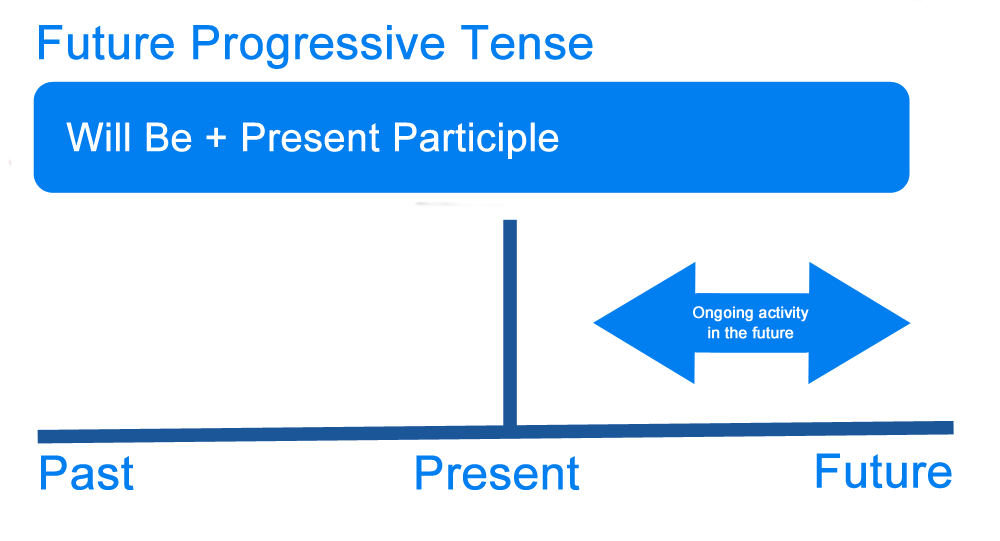The Future Continuous is used to describe an event or action that will be in progress at a given time in the future.
Meaning
The Future Continuous expresses the events that will last for a duration of time at some point in the future. These events or actions will start before the given time and may continue after it.
- Right now Daniel is working in a cafe. (Present Continuous)
- In 3 years’ time he hopes he will be running his own restaurant. (Future Continuous)
Here’s an illustration of what the Future Continuous (Progressive) expresses.



How to form Future Continuous
To make the Future Continuous, we use:
will be + “-ing” form of the verb (Present Participle)
| Singular | Plural |
| I will (’ll) be waiting You’ll be waiting He/she/it’ll be waiting | We’ll be waiting You’ll be waiting They’ll be waiting |
- This time next week I’ll be walking in the parks of Versailles.
- Tom will be starting school in September.
Negative forms of Future Continuous
To make a negative form of Future Continuous, just insert ‘not‘ between ‘will’ and ‘be (you can also use ‘won’t’).
- When Jack gets home, I won’t be working.
- He won’t be waiting for you tomorrow.
Questions in Future Continuous
To ask a question in Future Continuous, just swap ‘will’ and the subject of the sentence:
will + [subject] + be + -ing verb
- Will you be flying across India this time next year?
- Will he be eating lunch at 2pm?
When to use Future Continuous
Action in progress at a time in the future
- I will be meeting Tom this Saturday.
Interrupted action in the future
Here, the point of time in future is usually expressed by the word ‘when‘.
- She will be waiting for you when you arrive.
Parallel actions in the future
Here, the words ‘while‘ or ‘and‘ are usually used.
- Sam will be dancing while Paul will be singing.
Neutral questions
The Future Continuous is also used in neutral questions — to ask for information, but not to make a request.
Consider the following examples:
| Neutral question | Request |
| Will you be passing by the new grocery store? They have a wide selection of tea on sale. | Will you pass by the new grocery store, please? We’ve run out of tea. |
| Will you be attending the meeting this afternoon? Several interesting speakers are expected. | Will you attend the meeting this afternoon, please? They’ll discuss the topics of your interest. |
The Future Continuous can sometimes be formed with ‘going to’ instead of ‘will’, but this is less common.
Use am/is/are + going to be + the “-ing” form of the verb:
- I’m going to be studying all day long.
- Do you want to go to a concert tonight? My wife’s going to be performing.
- Shall we have lunch together on Friday? Peter and Jessica are going to be visiting our city.
Here’s a good video from AMES 836 explaining the structure and meaning of Future Continuous with examples:
See also: